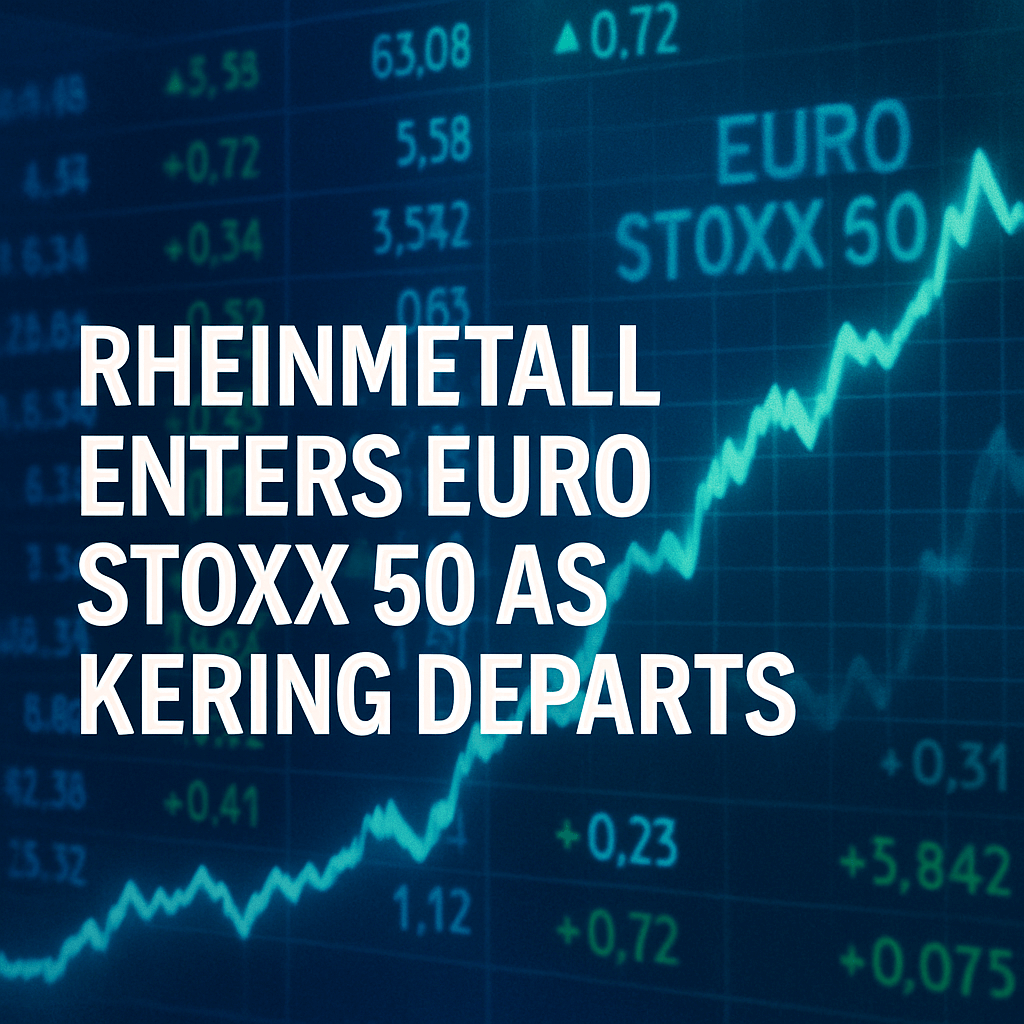Rheinmetall Enters Euro Stoxx 50 as Kering Departs

Recent developments in the European financial markets highlight a significant shift in investor sentiment and sector performance, with defense companies like Rheinmetall rising sharply, in stark contrast to the struggles faced by luxury conglomerates such as Kering. The transition reflects broader economic trends influenced by geopolitical events and changing consumer behaviors.
Defense Sector Surge
The defense sector has experienced remarkable growth over the past few years, amplified by escalating global tensions and renewed commitments to military spending across Europe and beyond. Rheinmetall, a leading German arms manufacturer with a diverse product portfolio that includes automotive components, is set to join the esteemed Euro Stoxx 50 index, which tracks 50 of the largest companies in the Eurozone. This announcement, confirmed by the Stoxx Group, will officially take effect on June 20.
Rheinmetall’s shares have skyrocketed by 250% in the last year alone, propelled by an urgent push for rearmament in response to heightened security concerns. Just recently, the company announced a substantial order for ammunition, an indicator of heightened military demand stemming from geopolitical conflicts.
Rheinmetall’s Financial Growth
In its latest financial report, Rheinmetall reported a staggering 61% increase in operating profits, amounting to €1.5 billion in the previous fiscal year. The company’s CEO, Armin Papperger, has expressed an optimistic outlook, forecasting that the company’s order book could expand by 450% over the next five years, driven largely by increased defense spending following the conflict in Ukraine.
This remarkable growth trajectory has allowed Rheinmetall to become a significant player on Germany’s DAX index, where it was added earlier this year. Its performance has outpaced traditional sectors, reinforcing the investor shift from luxury to defense assets as potential market stability wanes.
Kering’s Decline: The Luxury Sector Struggles
Conversely, Kering has faced a prolonged downturn, with sales plummeting by 12% to €17.2 billion in 2024. The group’s flagship brand, Gucci, recorded an alarming 23% drop in sales. The underlying factors for this dip include not just the shift in consumer preference but also economic pressures, notably U.S. tariffs impacting Kering’s pricing strategy. The company has been slow to adapt to these changes, choosing not to significantly increase production in the United States.
Over the past year, Kering’s stock has depreciated by approximately 47.4%, signifying a critical need for strategic realignment. The luxury sector has been plagued by declining demand, particularly in emerging markets where consumer spending has been constrained. This struggle mirrors broader trends observed in the luxury industry, as evidenced by comparable cases like Burberry, which was similarly removed from the FTSE 100 last September.
Industry Implications and Future Outlook
- Changing Investment Landscapes: The juxtaposition between the defense and luxury sectors illustrates a striking shift in investor priorities. As geopolitical uncertainties continue to shape economic landscapes, investors may increasingly favor sectors deemed essential for national security over luxury markets impacted by discretionary spending constraints.
- Other Possible Reshuffles: Analysts, including JPMorgan’s Pankaj Gupta, have hinted at further positional changes within the Euro Stoxx 50, considering potential entries like Deutsche Bank and Siemens, both of which could reflect ongoing market dynamics.
The Defense Sector’s Stock Performance
Over recent months, companies within the defense contract sphere such as Safran and Airbus have also shown strong performance metrics on the Euro Stoxx 50. Many defense manufacturers are seeing stock increases, aligning with government budgets that are increasingly oriented towards military spending.
Conclusions
The shifts in market compositions within major European indices like the Euro Stoxx 50 are emblematic of broader economic conditions. As the landscape changes, with defense manufacturers gaining significant traction, luxury brands like Kering must navigate a challenging market. The diverging paths between these sectors may inform investment strategies as economic dynamics continue to evolve.
For Rheinmetall, this inclusion in the Euro Stoxx 50 represents not only a recognition of its financial success but also an alignment with a growing sentiment favoring defense-related investments amid ongoing geopolitical unrest.
Stoxx, Rheinmetall, and Kering did not immediately respond to inquiries for comment regarding the index changes.